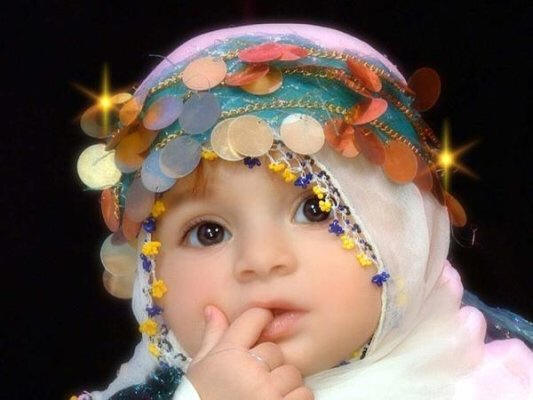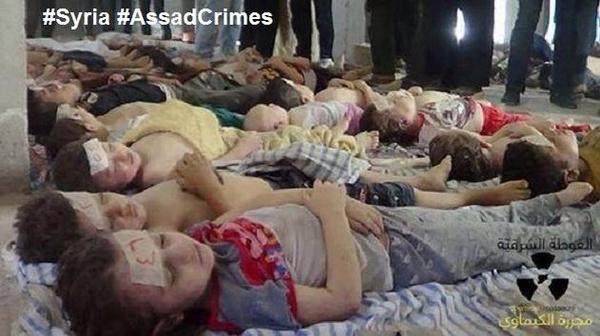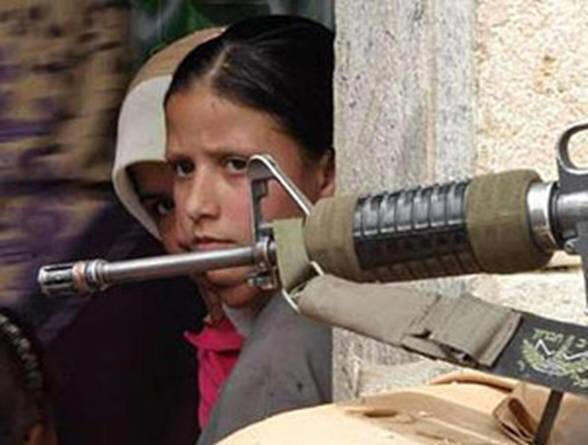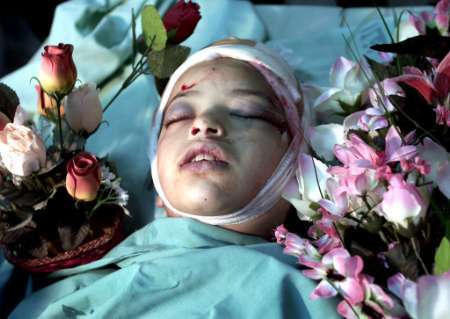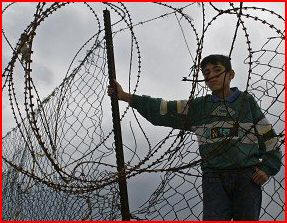by Michael R. Burch
Where does the butterfly go
when lightning rails
when thunder howls
when hailstones scream
while winter scowls
and nights compound dark frosts with snow?
Where does the butterfly go?
Where does the rose hide its bloom
when night descends oblique and chill
beyond the capacity of moonlight to fill?
When the only relief's a banked fire's glow,
where does the butterfly go?
And where shall the spirit flee
when life is harsh, too harsh to face,
and hope is lost without a trace?
Oh, when the light of life runs low,
where does the butterfly go?
Ahmad Al-Za’tar
by Mahmoud Darwish
translated by Tania Nasir
For two hands, of stone and of thyme
I dedicate this song. For Ahmad, forgotten between two butterflies
The clouds are gone and have left me homeless, and
The mountains have flung their mantles and concealed me
From the oozing old wound to the contours of the land I descend, and
The year marked the separation of the sea from the cities of ash, and
I was alone
Again alone
O alone? And Ahmad
Between two bullets was the exile of the sea
A camp grows and gives birth to fighters and to thyme
And an arm becomes strong in forgetfulness
Memory comes from trains that have left and
Platforms that are empty of welcome and of jasmine
In cars, in the landscape of the sea, in the intimate nights of prison cells
In quick liaisons and in the search for truth was
The discovery of self
In every thing, Ahmad found his opposite
For twenty years he was asking
For twenty years he was wandering
For twenty years, and for moments only, his mother gave him birth
In a vessel of banana leaves
And departed
He seeks an identity and is struck by the volcano
The clouds are gone and have left me homeless, and
The mountains have flung their mantles and concealed me
I am Ahmad the Arab, he said
I am the bullets, the oranges and the memory
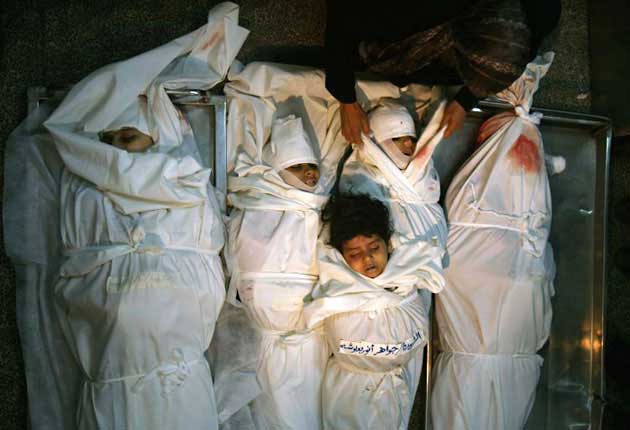
Look at me
by Nahida Izzat
Look at me
I would love to write poetry about love,
Paint rainbows and butterflies,
Smell the scent of pink rose buds,
And dance;
Dance with the melody of jubilant bluebirds
I would love to close my eyes and see children smiling
No guns pointing at their heads
Tell them stories of lily-like fairies in far-away lands
Not of bullets shrieking . . . of missiles exploding
But
How can I?
There is a dagger in my heart
I am hurting
Hurting
I bleed,
I cringe
I cry
HUMANITY, WHERE ARE YOU?
I am being slaughtered
Under your watchful eyes
I am cold . . . cold . . . cold
I cringe
I cry
Humanity, where are you?
Why do you turn your face away?
Why do you keep looking the other way?
I am here
Languishing
In
Humanity, where are you?
Look at me
See me
I am here
Sighing
In
I cringe
I cry
Humanity,
Enough turning the other way !
Turning a deaf ear
Turning a blind eye
While I,
and oh! my poor children
Die
Armed with a prayer
by Iqbal Tamimi
Once upon a crime,
the night
hijacked the face of my homeland.
The next day,
the spring was pronounced dead.
My blood
lost its way rivuletting through sand.
I was not courageous enough
to declare
the theft of my skin;
It was stretched by loathsome hands
to create a new face for an old drum.
There . . .
sat my anxiety
on the banks of pain,
washing my punctured voice,
asking me
how would I . . .
fish for my poem’s crumbs in a mine field?
What could I say?
For . . .
I had lost the dawn in the market,
my mouth was stuffed
with the sweat of my exile,
nothing of me remained
but
my few half-living fingers
exhuming the guts of lines,
a nose . . .
striving hard to find its way home,
and a pair of eyes,
that looked but could not see
any
of the absent loved ones,
who used to be there for me.
My pulse was swinging,
documenting my name,
alongside others hanging
on the verge of plight.
My loaf was naked.
I was armed only with a prayer.
A child beneath the rubble
Screamed, calling my name
Mama . . . Please . . .
tell them not to execute my kite.
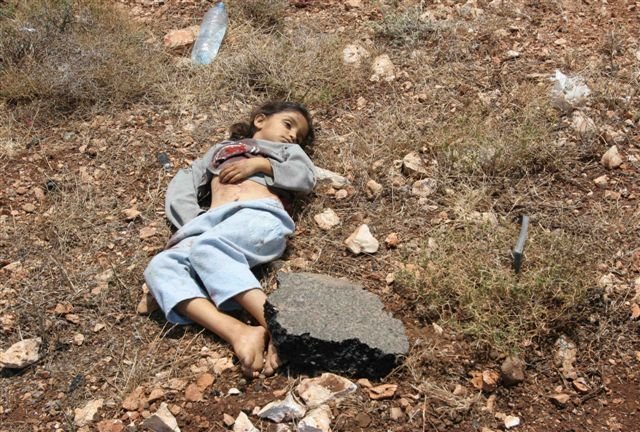
Suffer the Little Children
by Nakba
I saw the carnage . . . saw girls' dreaming heads
blown to red atoms, and their dreams with them . . .
saw babies liquefied in burning beds
as, horrified, I heard their murderers’ phlegm . . .
I saw my mother stitch my shroud’s black hem,
for in that moment I was one of them . . .
I saw our Father’s eyes grow hard and bleak
to see frail roses severed at the stem . . .
How could I fail to speak?
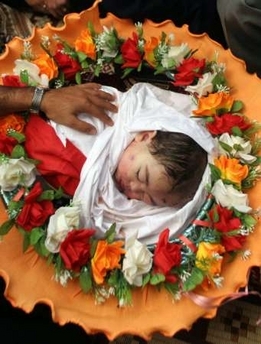
I Pray Tonight
by Michael R. Burch
for the children of Ghouta
and their mothers
I pray tonight
the starry Light
might
surround you.
I pray
by day
that, come what may,
no dark thing confound you.
I pray ere tomorrow
an end to your sorrow.
May angels' white chorales
sing, and astound you.
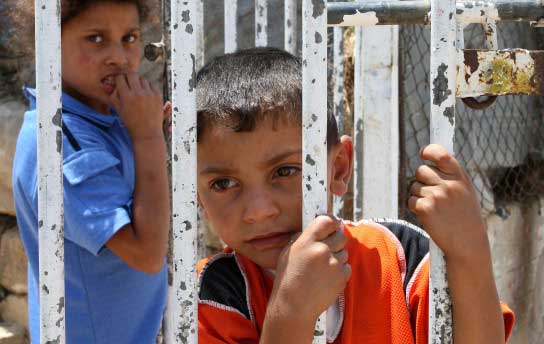
Something
by Michael R. Burch
for the mothers and children of Ghouta
Something inescapable is lost—
lost like a pale vapor curling up into shafts of moonlight,
vanishing in a gust of wind toward an expanse of stars
immeasurable and void.
Something uncapturable is gone—
gone with the spent leaves and illuminations of autumn,
scattered into a haze with the faint rustle of parched grass
and remembrance.
Something unforgettable is past—
blown from a glimmer into nothingness, or less,
and finality has swept into a corner where it lies
in dust and cobwebs and silence.
Mother’s Smile
by Michael R. Burch
for the mothers of Ghouta and their children
There never was a fonder smile
than mother’s smile, no softer touch
than mother’s touch. So sleep awhile
and know she loves you more than “much.”
So more than “much,” much more than “all.”
Though tender words, these do not speak
of love at all, nor how we fall
and mother’s there, nor how we reach
from nightmares in the ticking night
and she is there to hold us tight.
There never was a stronger back
than father’s back, that held our weight
and lifted us, when we were small,
and bore us till we reached the gate,
then held our hands that first bright mile
till we could run, and did, and flew.
But, oh, a mother’s tender smile
will leap and follow after you!
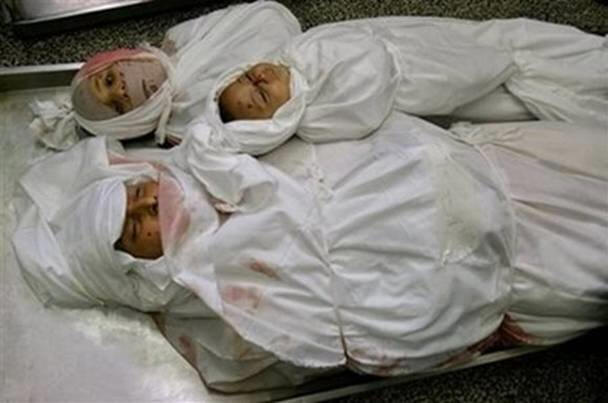
Labor Pains
by Fadwa Tuqan
The wind blows the pollen in the night
through ruins of fields and homes.
Earth shivers with love,
with the pain of giving birth,
but the conqueror wants us to believe
stories of submission and surrender.
O Arab Aurora!
Tell the usurper of our land
that childbirth is a force unknown to him,
the pain of a mother’s body,
that the scarred land
inaugurates life
at the moment of dawn
when the rose of blood
blooms on the wound.
Excerpts from Under Siege
by Mahmoud Darwish
translated by Marjolijn De Jager
Here on the slopes of hills, facing the dusk and the cannon of time
Close to the gardens of broken shadows,
We do what prisoners do,
And what the jobless do:
We cultivate hope.
A country preparing for dawn. We grow less intelligent
For we closely watch the hour of victory:
No night in our night lit up by the shelling
Our enemies are watchful and light the light for us
In the darkness of cellars.
Here there is no "I".
Here Adam remembers the dust of his clay.
You who stand in the doorway, come in,
Drink Arabic coffee with us
And you will sense that you are men like us
You who stand in the doorways of houses
Come out of our morningtimes,
We shall feel reassured to be
Men like you!
When the planes disappear, the white, white doves
Fly off and wash the cheeks of heaven
With unbound wings taking radiance back again, taking possession
Of the ether and of play. Higher, higher still, the white, white doves
Fly off. Ah, if only the sky
Were real [a man passing between two bombs said to me].
Cypresses behind the soldiers, minarets protecting
The sky from collapse. Behind the hedge of steel
Soldiers piss—under the watchful eye of a tank—
And the autumnal day ends its golden wandering in
A street as wide as a church after Sunday mass . . .
[To a killer] If you had contemplated the victim’s face
And thought it through, you would have remembered your mother in the
Gas chamber, you would have been freed from the reason for the rifle
And you would have changed your mind: this is not the way
to find one’s identity again.
The siege is a waiting period
Waiting on the tilted ladder in the middle of the storm.
Alone, we are alone as far down as the sediment
Were it not for the visits of the rainbows.
We have brothers behind this expanse.
Excellent brothers. They love us. They watch us and weep.
Then, in secret, they tell each other:
"Ah! if this siege had been declared . . . " They do not finish their sentence:
"Don’t abandon us, don’t leave us."
Our losses: between two and eight martyrs each day.
And ten wounded.
And twenty homes.
And fifty olive trees . . .
Added to this the structural flaw that
Will arrive at the poem, the play, and the unfinished canvas.
Oh watchmen! Are you not weary
Of lying in wait for the light in our salt
And of the incandescence of the rose in our wound
Are you not weary, oh watchmen? ...
Greetings to the one who shares my glass with me
In the denseness of a night outflanking the two spaces:
Greetings to my apparition.
My friends are always preparing a farewell feast for me,
A soothing grave in the shade of oak trees
A marble epitaph of time
And always I anticipate them at the funeral:
Who then has died . . . who?
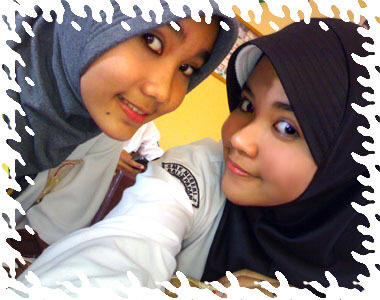
Related pages: Sandy Hook Poems, Aurora Poetry, Columbine Poems, Courtni Webb's Sandy Hook Poem and Possible Expulsion, Darfur Poems, Gaza Poems, Haiti Poems, Hiroshima Poems, Holocaust Poems, Nakba Poems, 911 Poems, Trail of Tears
The HyperTexts
